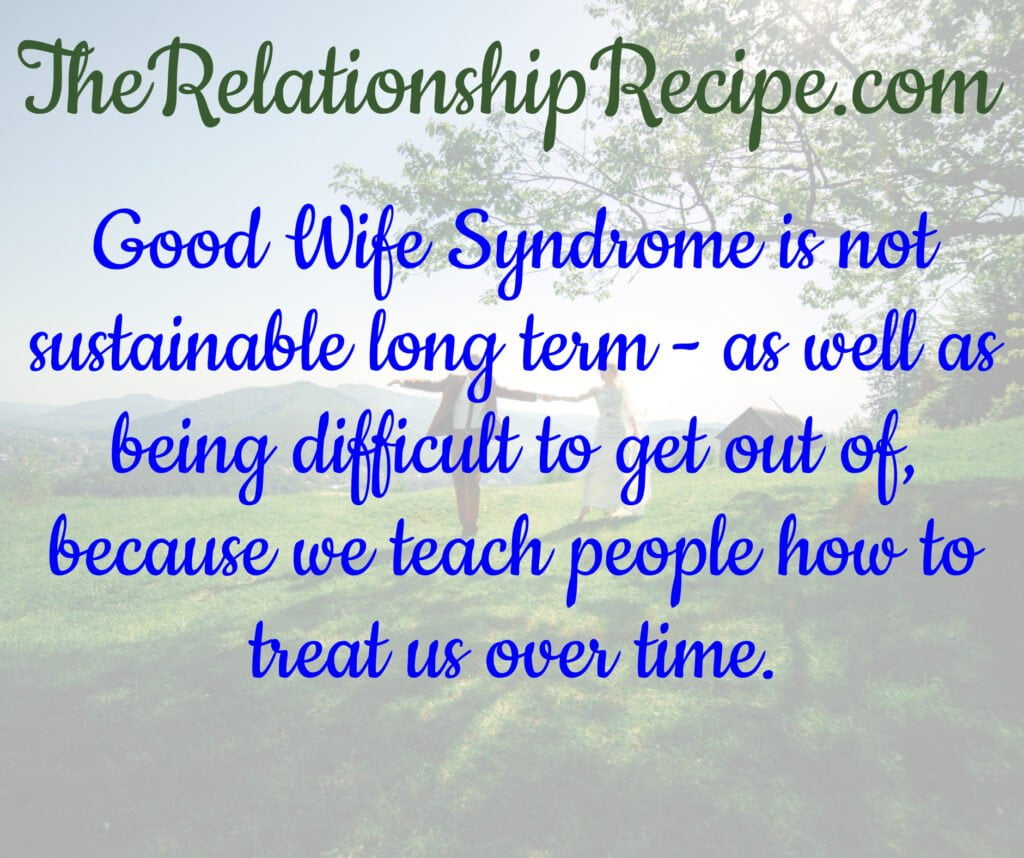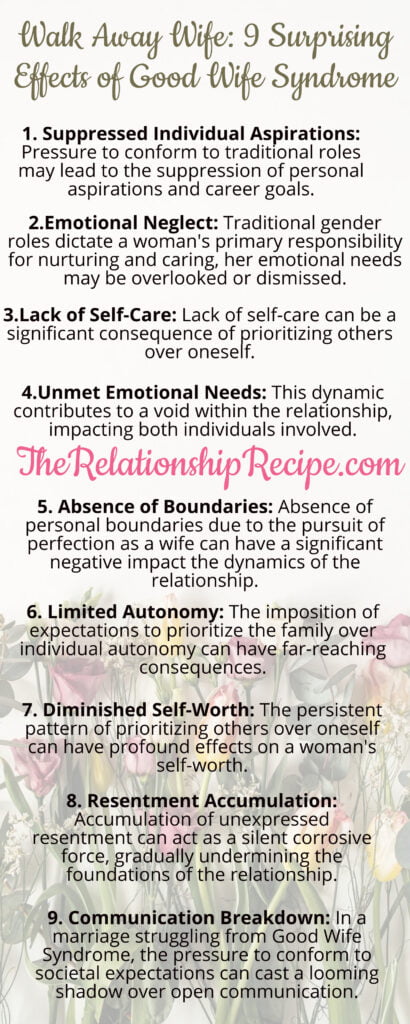What is The Good Wife Syndrome?
The Good Wife Syndrome encompasses a set of societal expectations and traditional roles assigned to women within the context of marriage. Historically, women have been conditioned to prioritize their husband’s needs, manage household affairs, and maintain a facade of unwavering support, often at the expense of their own aspirations and desires.
The Good Wife Syndrome thrives on the belief that a “good wife” should be selfless, nurturing, and continuously prioritize the well-being of her spouse and family while running herself ragged and putting herself last.

Good Wife Syndrome is not sustainable long term – as well as being difficult to get out of because we teach people how to treat us over time.
Real-Life Examples of Good Wife Syndrome:
- Jane, a successful professional, gave up her promising career to support her husband’s ambitions, adhering to the societal expectation that a good wife sacrifices her career for her family.
- Sarah spent endless hours catering to her family’s needs, neglecting her own well-being, under the assumption that a good wife puts everyone else first.
What is Walkaway Wife Syndrome?
Walkaway Wife Syndrome, on the other hand, refers to a situation where a wife, after enduring years of emotional neglect, lack of appreciation, or unmet needs, contemplates leaving the marriage. The cumulative impact of feeling unfulfilled and undervalued can lead a woman to reach a breaking point, prompting her to consider being a walk away wife for her own emotional well-being.
Real-Life Examples of Walkaway Wife Syndrome:
- Emily found herself emotionally distant from her husband, who consistently belittled her aspirations and dismissed her feelings, leading her to contemplate leaving for a chance at happiness.
- Maria, feeling unappreciated and emotionally neglected, reached a point where the desire for personal fulfillment and emotional connection became stronger than the commitment to an unfulfilling marriage.

9 Ways The Good Wife Syndrome Can Lead to Walkaway Wife:
1. Suppressed Individual Aspirations
The pressure to conform to traditional roles may lead to the suppression of personal aspirations and career goals.
The pressure to conform to traditional roles within a marriage struggling with good wife syndrome, not only stifles personal aspirations and career goals but can also create a pervasive sense of unmet potential. As we navigate the complexities of a relationship that is faltering, the weight of societal expectations to prioritize the role of a devoted spouse and caregiver can overshadow their own aspirations.
The Consequences of Suppression:
Career Stagnation: In a failing marriage, the suppression of personal aspirations often manifests in a woman’s professional life. The sacrifice of career goals to uphold traditional roles can lead to stagnation in the workplace, hindering professional growth and development.
Loss of Identity: As personal aspirations take a back seat, a woman may experience a gradual loss of individual identity. The constant focus on meeting familial expectations may result in a diminishing sense of self.
Emotional Toll: The suppression of personal dreams and ambitions can take an emotional toll on an individual. Feelings of unfulfillment and frustration may intensify within a marriage on the edge of walkaway wife syndrom.
Resentment: Over time, the accumulation of unexpressed aspirations may give rise to resentment. The woman may harbor feelings of frustration and bitterness, questioning the sacrifices made for the relationship.
Relationship Strain: The strain on individual aspirations can extend into the marriage about to fail from good wife syndrome. As one partner suppresses their desires, the emotional distance between spouses may widen, contributing to the overall deterioration of the relationship.

2. Emotional Neglect
In a marriage about to cave in under the weight of an eventual walkaway wife, the relentless focus on meeting the needs of others can lead to emotional neglect, leaving the woman feeling isolated and unappreciated. As the traditional gender roles dictate a woman’s primary responsibility for nurturing and caring, her emotional needs may be overlooked or dismissed.
The consequences of emotional neglect can be profound and far-reaching, impacting various aspects of a woman’s well-being and the dynamics of relationships. Here are some of the key consequences:
Diminished Emotional Well-being:
Emotional neglect can lead to a decline in emotional well-being, resulting in feelings of loneliness, sadness, and anxiety. The lack of emotional support and validation can contribute to low self-esteem and a diminished sense of self-worth.
Increased Vulnerability to Mental Health Issues:
Individuals experiencing emotional neglect may be more susceptible to mental health issues such as depression and anxiety. The absence of emotional support can exacerbate existing mental health challenges and contribute to the development of new ones.
Impact on Physical Health:
Emotional neglect isn’t confined to mental and emotional well-being; it can also affect physical health. Chronic stress resulting from emotional neglect has been linked to various health issues, including cardiovascular problems and compromised immune function.
Escapism and Unhealthy Coping Mechanisms:
To cope with the emotional void caused by neglect, we may turn to unhealthy coping mechanisms such as substance abuse, excessive work, or other forms of escapism. These behaviors can further strain relationships and hinder personal growth.
Repeating Patterns in Future Relationships:
Adults who experienced emotional neglect in their formative years may unknowingly perpetuate similar patterns in their adult relationships. Without intervention, the cycle of emotional neglect can continue through generations.
Impact on Self-Expression:
Emotional neglect can stifle one’s ability to express themselves authentically. You may become hesitant to share their thoughts and emotions, fearing they won’t be understood or accepted.
Difficulty Trusting Others:
Trust is a fundamental element of any healthy relationship, and emotional neglect can erode this foundation. Individuals who have experienced neglect may find it challenging to trust others with their emotions, making it difficult to form deep connections.
Reduced Resilience to Life’s Challenges:
The emotional support derived from healthy relationships contributes to resilience in the face of life’s challenges. Emotional neglect diminishes this resilience, making it harder for us to navigate stressors and setbacks.

3. Lack of Self-Care
In a troubled marriage that is struggling under good wife syndrome, the lack of self-care can be a significant consequence of prioritizing others over oneself. The relentless focus on meeting the needs of a partner, children, or family members may result in neglecting one’s own well-being. Here are several aspects to consider when exploring the consequences of neglecting self-care:
Physical Health Implications:
Neglecting self-care often manifests physically, with individuals experiencing fatigue, sleep disturbances, and compromised immune function. The toll on physical health can be substantial, contributing to a cycle of exhaustion and decreased resilience.
Emotional Burnout:
The absence of self-care can lead to emotional burnout, characterized by feelings of overwhelm, frustration, and a sense of being emotionally drained. Emotional exhaustion can further strain the marital relationship, making it challenging to navigate conflicts effectively.
Diminished Mental Well-being:
The continuous neglect of personal well-being can have detrimental effects on mental health. Anxiety and depression may surface as we grapple with the emotional toll of a failing marriage and the associated lack of self-care.
Impact on Self-Esteem:
Neglecting oneself in favor of prioritizing others can contribute to a decline in self-esteem. Over time, individuals may internalize a diminished sense of self-worth, making it difficult to assert their needs within a marriage affected by good wife syndrome.
Strained Marital Dynamics:
A lack of self-care can exacerbate existing marital issues, contributing to heightened tensions and conflicts. The inability to address personal needs may lead to resentment and further distance between partners.
Reduced Capacity for Empathy:
Constantly neglecting self-care may diminish one’s capacity for empathy within the marriage. When individuals are emotionally depleted, it becomes challenging to empathize with their partner’s needs, exacerbating communication breakdowns.
Loss of Individual Identity:
The failure to engage in self-care can result in a loss of individual identity. Over time, individuals may become so entwined with their role in the marriage dictated by good wife syndrome, that they struggle to define themselves outside of that context.
Impact on Parenting:
For couples with children, the lack of self-care can extend to parenting responsibilities. Emotional exhaustion may hinder one’s ability to be present and engaged with their children, impacting the overall family dynamic.

4. Unmet Emotional Needs
When a marriage is on the verge of walkaway wife syndrome, the persistent pattern of self-sacrifice and prioritizing others can result in the neglect of essential emotional needs. This dynamic contributes to a void within the relationship, impacting both individuals involved. Here are key aspects to consider when examining the consequences of unmet emotional needs:
Communication Breakdown:
The failure to address and fulfill emotional needs can lead to a breakdown in communication. Partners may struggle to express their feelings, desires, and concerns, fostering an environment where emotional intimacy diminishes over time.
Resentment and Frustration:
Unmet emotional needs often give rise to resentment and frustration. The partner sacrificing their own needs may harbor feelings of disappointment, feeling unappreciated or undervalued, while the other partner may be unaware of the growing emotional distance.
Impact on Intimacy:
Emotional intimacy is closely tied to the fulfillment of emotional needs. When these needs go unmet, intimacy within the relationship can suffer. This may manifest as a decline in physical affection, closeness, and shared vulnerability.
Escalation of Conflict:
As emotional needs go unmet, conflicts within the relationship may escalate. Unexpressed emotions can resurface in the form of arguments or passive-aggressive behavior, creating additional strain on the marital dynamics.
Vulnerability to External Influences:
A marriage with unmet emotional needs due to Good Wife Syndrome becomes vulnerable to external influences. Individuals may seek emotional support or connection outside the marriage, inadvertently opening the door to potential infidelity or seeking solace in friendships that fulfill neglected needs.

5. Absence of Boundaries
When a marriage is in trouble, the absence of personal boundaries due to the pursuit of perfection as a wife can have a significant negative impact the dynamics of the relationship.
Overwhelm and Burnout:
The constant effort to meet unrealistic expectations without establishing boundaries often leads to feelings of overwhelm and burnout. The wife may find herself stretched thin, trying to fulfill roles and responsibilities without considering her own well-being.
Impact on Mental Health:
The relentless pursuit of perfection without boundaries can take a toll on mental health. Anxiety, stress, and a sense of inadequacy may manifest as the wife struggles to maintain an unrealistic standard, impacting her overall emotional resilience.
Strain on Relationships:
Absence of personal boundaries can strain relationships within and outside the marriage with a woman struggling under the good wife syndrome. Friends and family may feel neglected as the wife dedicates excessive time and energy to fulfill her perceived role, potentially leading to strained connections.
Communication Breakdown:
The inability to establish and communicate clear boundaries may result in a breakdown of communication within the marriage. Partners may be unaware of the wife’s struggles, contributing to misunderstandings and potential conflicts.
Cycle of Overcommitment:
Without clear boundaries, the wife may find herself trapped in a cycle of overcommitment. The inability to say no or establish limits can result in taking on more responsibilities than manageable, perpetuating a cycle of stress and exhaustion.

6. Limited Autonomy
In an unhappy marriage affected by Good Wife Syndrome, the imposition of expectations to prioritize the family over individual autonomy can have far-reaching consequences. Exploring the facets of limited autonomy unveils the impact it can have on the dynamics of the relationship:
Restricted Decision-Making:
The expectation to prioritize the family often results in restricted decision-making for the woman suffering from good wife syndrome. Significant choices, ranging from career decisions to personal pursuits, may be influenced or dictated by the overarching family-centric expectations.
Stifled Personal Growth:
Limited autonomy stifles personal growth as individuals may find themselves constrained by predefined roles and expectations. Pursuing personal aspirations or exploring new avenues may be hindered, contributing to a sense of stagnation and unfulfillment.
Dependency Dynamics:
The emphasis on family priorities can inadvertently foster dependency dynamics. The individual may become overly reliant on the family structure, compromising the development of self-sufficiency and the ability to navigate challenges independently.
Impact on Self-Esteem:
Constant prioritization of the family’s needs over individual autonomy can erode self-esteem. The individual may begin to question their worth and capabilities, especially if personal aspirations are consistently sidelined in favor of family-centric expectations.
Role Confusion:
Limited autonomy can lead to role confusion, where the individual’s identity becomes entangled with predefined roles within the family structure. Distinguishing one’s own identity apart from familial expectations becomes a challenging endeavor.
Communication Challenges:
Limited autonomy can contribute to communication challenges within the marriage about to blow apart from good wife syndrome. The woman may hesitate to express her true feelings, desires, or concerns, fearing potential repercussions or a lack of understanding from their partner.
Impact on Relationship Dynamics:
The imbalance created by limited autonomy can significantly impact relationship dynamics. Partners may struggle to connect on a deeper level when individual aspirations and autonomy are not adequately acknowledged and supported.
Potential for Unfulfilled Lives:
The overarching prioritization of family needs may result in individuals leading lives that fall short of personal fulfillment. Unexplored passions, unfulfilled ambitions, and neglected self-care can contribute to a sense of longing and dissatisfaction.

7. Diminished Self-Worth:
In a marriage stifled by good wife syndrome, the persistent pattern of prioritizing others over oneself can have profound effects on a woman’s self-worth.
Inadequacy and Self-Doubt:
The consistent prioritization of others can cultivate a sense of inadequacy and self-doubt. Individuals may internalize the belief that their needs, desires, and contributions are of lesser importance, creating a damaging narrative about their own worth.
Cycle of Perfectionism:
The pursuit of perfectionism to meet the expectations of being the “perfect” partner or spouse can exacerbate feelings of diminished self-worth. Constantly striving for an unrealistic standard may lead to burnout and a perpetual sense of falling short.
Struggles with Assertiveness:
Women experiencing diminished self-worth may struggle with assertiveness. The fear of asserting one’s needs or boundaries can perpetuate a cycle of compliance, even in situations where personal well-being is compromised.
Effects on Intimacy:
Diminished self-worth can extend to the realm of intimacy, creating barriers to emotional and physical connection. Individuals may struggle to engage authentically, fearing rejection or judgment based on their perceived lack of worth.
Role of External Validation:
Seeking external validation becomes a common coping mechanism for those with diminished self-worth. Women on the verge of walkaway wife syndrome may excessively rely on external praise and approval to compensate for the internal void created by feelings of inadequacy within the marriage.
Breakdown of Communication:
The erosion of self-worth can contribute to a breakdown in communication. Women may hesitate to express their true feelings, concerns, or desires, fearing further damage to their already fragile sense of self.

8. Resentment Accumulation
In a marriage suffering from good wife syndrome, the accumulation of unexpressed resentment can act as a silent corrosive force, gradually undermining the foundations of the relationship.
Communication Breakdown:
Unexpressed resentment often leads to a breakdown in communication. As grievances go unaddressed, a widening gap emerges between partners, hindering open and honest dialogue. The silence surrounding resentful feelings can foster a sense of isolation within the marriage.
Erosion of Emotional Connection:
The unspoken weight of accumulated resentment erodes the emotional connection between partners. Over time, the intimacy that once characterized the relationship may diminish, replaced by a growing emotional distance.
Catalyst for Negative Interactions:
Resentment becomes a catalyst for negative interactions within the marriage gripped by good wife syndrome. Small disagreements or misunderstandings may trigger disproportionately intense reactions fueled by the underlying reservoir of unresolved resentment.
Cycle of Escalation:
As resentment accumulates, there is a propensity for conflict to escalate. What might have been a minor disagreement can escalate into a larger confrontation, fueled by the pent-up emotions of unaddressed grievances.
Perception of Unfairness:
Women harboring resentment may perceive the relationship as fundamentally unfair. This perception can exacerbate feelings of victimization, intensifying the desire to seek relief from the perceived injustices within the marriage, which may further acclerate into walkaway wife territory.
Resistance to Reconciliation:
The presence of accumulated resentment creates resistance to reconciliation efforts. Partners may become hesitant to engage in meaningful dialogue or consider relationship counseling due to the deep-seated bitterness resulting from unresolved grievances.
Effect on Problem-Solving:
Resentment can impair the couple’s ability to effectively solve problems. The focus shifts from collaborative resolution to a more adversarial approach, hindering the development of healthy conflict-resolution strategies.
Culmination in the Desire for Liberation:
Over time, the weight of accumulated resentment may culminate in a profound desire for liberation. Wives seeking relief from the emotional burden, may contemplate separation or divorce as a means to break free from the cycle of unresolved grievances.

9. Communication Breakdown: The Impact on Personal Needs and Desires
In the intricate dance of a marriage struggling from Good Wife Syndrome, the pressure to conform to societal expectations can cast a looming shadow over open communication.
Silencing Individual Voices:
The pressure to conform often results in the silencing of individual voices within the marriage. Partners may hesitate to express their true feelings, fearing they may deviate from the expected roles and responsibilities ingrained in societal norms.
Suppression of Authenticity:
Conformity can lead to the suppression of authenticity, where individuals feel compelled to present a curated version of themselves that aligns with societal expectations. This self-editing process hampers genuine communication and prevents the authentic expression of personal needs.
Struggle for Emotional Expression:
The struggle to conform may extend to emotional expression, hindering the ability to openly convey personal feelings and needs. Partners may find themselves trapped in a cycle of unspoken emotions, leading to a communication impasse.
Fear of Judgment:
Conforming to societal expectations often brings with it a fear of judgment. This fear can be a powerful deterrent to open communication, as individuals may worry about how their needs and desires will be perceived by their partner and the external world.
Impact on Intimacy:
Communication breakdown stemming from conformity can significantly impact intimacy. The inability to openly express desires may create emotional distance between partners, hindering the development of a deeper, more meaningful connection.

Role Conflict: Navigating Turmoil Between Societal Expectations and Personal Aspirations
The intricacies of role conflict within a marriage strained under Good Wife Syndrome unravel as couples struggleand clash between societal expectations and personal aspirations. This internal strife becomes a poignant element in the narrative of a relationship teetering on the edge, influencing dynamics in profound ways:
Divergent Expectations:
The clash between societal expectations and personal aspirations sets the stage for divergent expectations within the relationship. Partners may find themselves grappling with conflicting visions of what their roles should entail, creating an undercurrent of tension.
Internalized Guilt and Shame:
The internal turmoil stemming from role conflict often manifests as feelings of guilt and shame. Wives on the verge of walkaway wife may grapple with guilt for not adhering to societal expectations or shame for suppressing their authentic aspirations to fit into predefined roles.
Impact on Mental Well-Being:
Role conflict takes a toll on mental well-being, leading to heightened stress, anxiety, and a sense of inner discord. The persistent struggle to reconcile societal norms with personal desires contributes to a pervasive state of emotional unease.
Communication Barriers:
Role conflict introduces communication barriers as partners grapple with articulating their internal struggles. The inability to express the turmoil within impedes open dialogue, creating a wedge that hinders the couple’s capacity to navigate the complexities of their evolving needs.
Roadblock to Relationship Growth:
The pervasive role conflict acts as a roadblock to relationship growth, thwarting the couple’s ability to evolve together. Instead of navigating shared aspirations, partners grapple with internal turmoil that impedes the collaborative journey toward a fulfilling and harmonious relationship.
Conclusion
The intertwining of The Good Wife Syndrome and Walkaway Wife Syndrome highlights the intricate dynamics within marriages. Recognizing the societal expectations placed on women and understanding the emotional toll of conforming to these roles is important for creating healthy relationships.

https://www.marriage.com/advice/mental-health/signs-of-walkaway-wife-syndrome/
https://www.today.com/health/get-rid-good-wife-syndrome-wbna5113550
This post may contain affiliate links. I earn from qualifying Amazon purchases at no extra cost to you.




